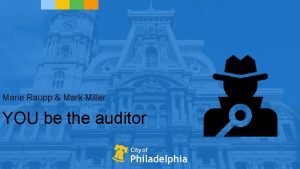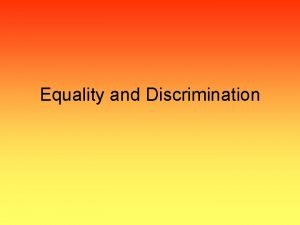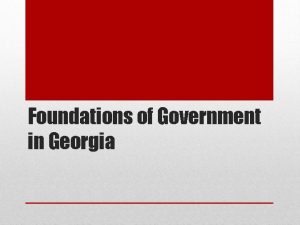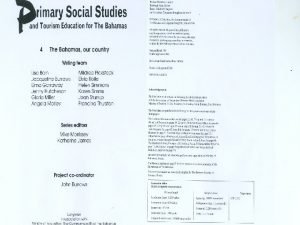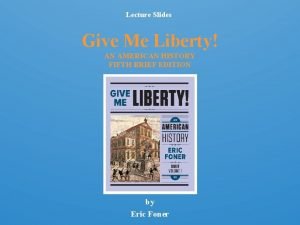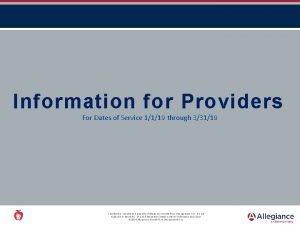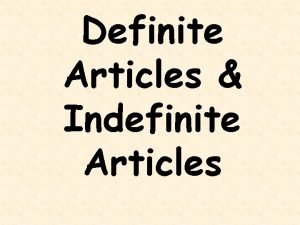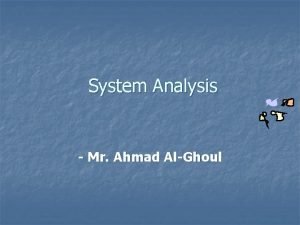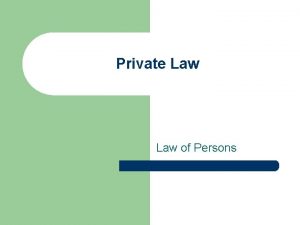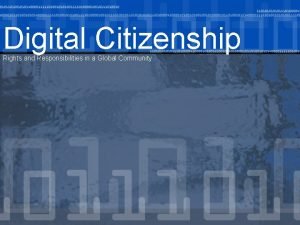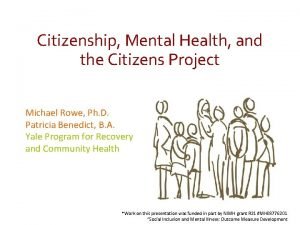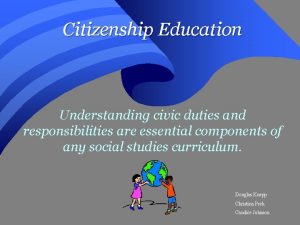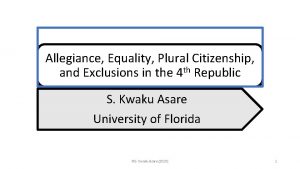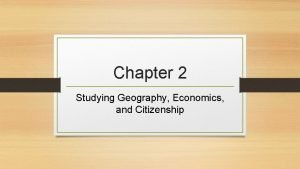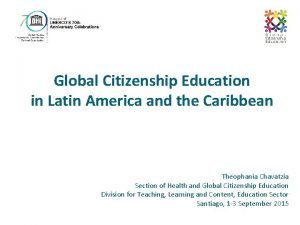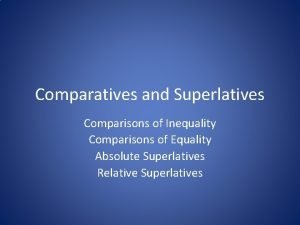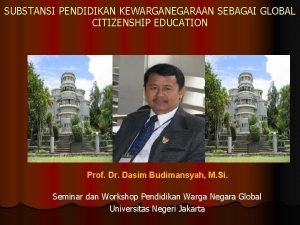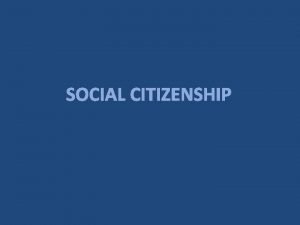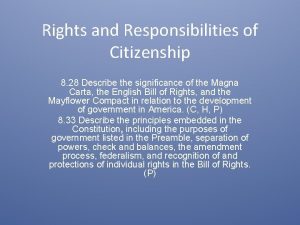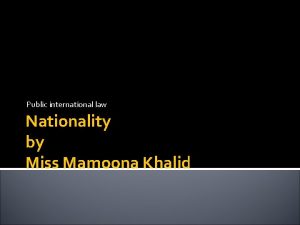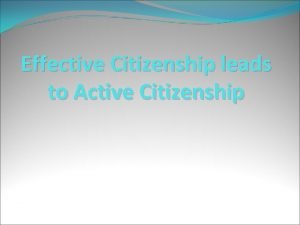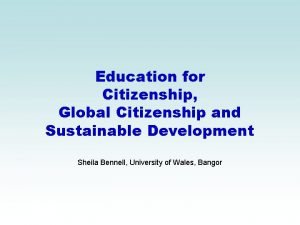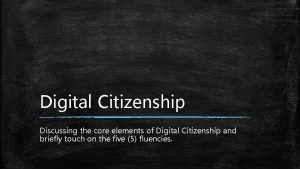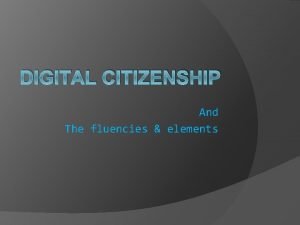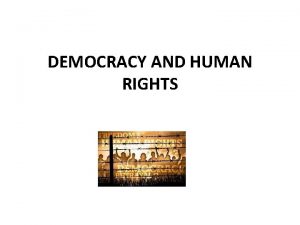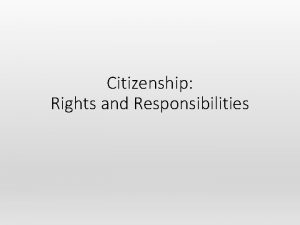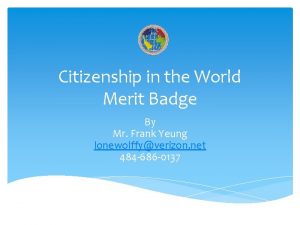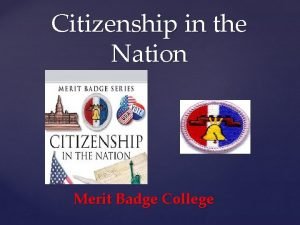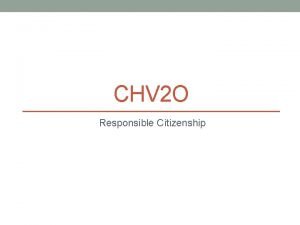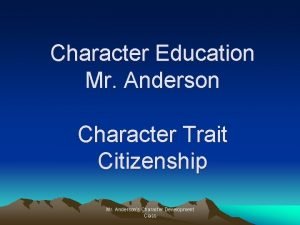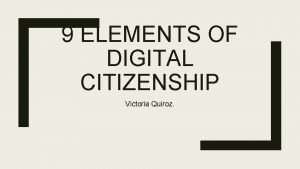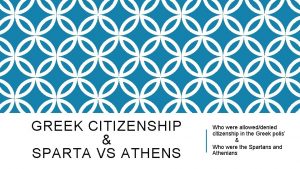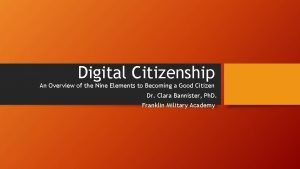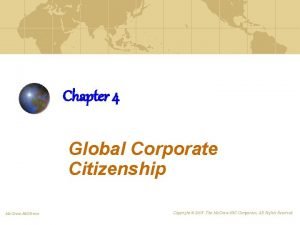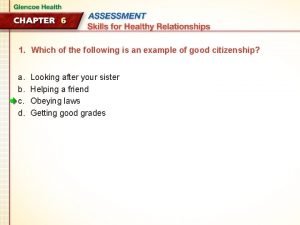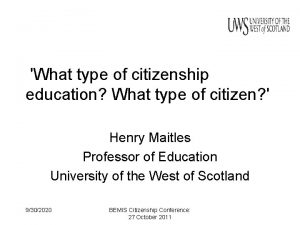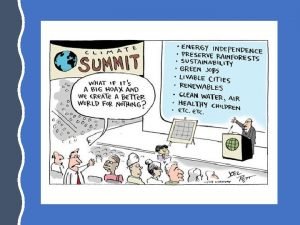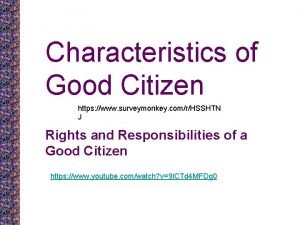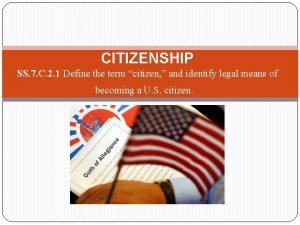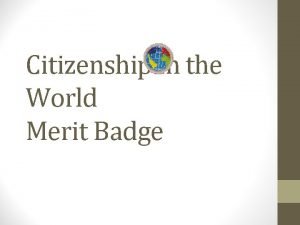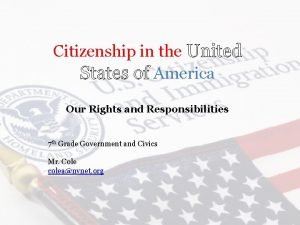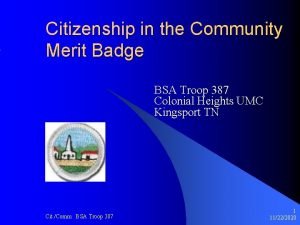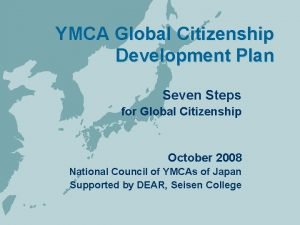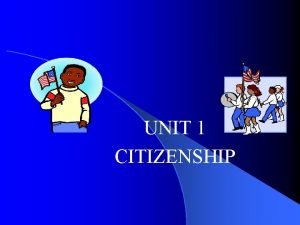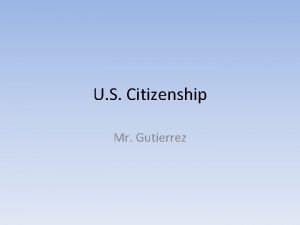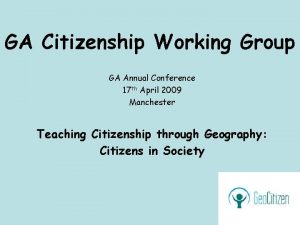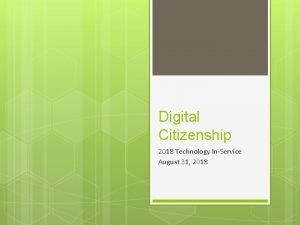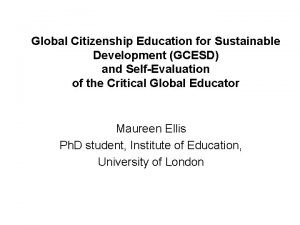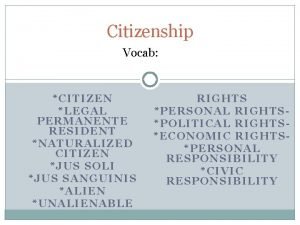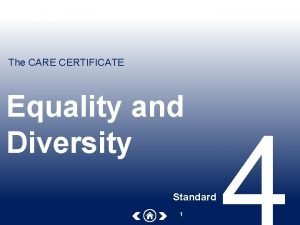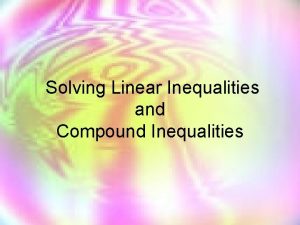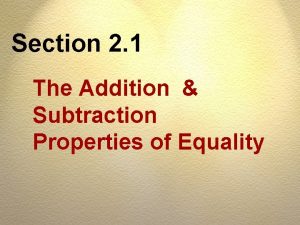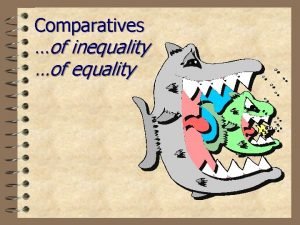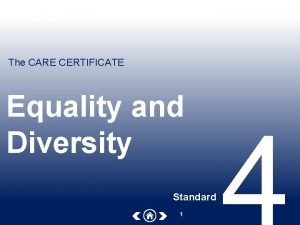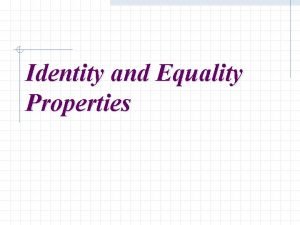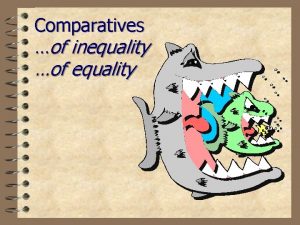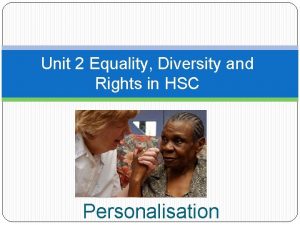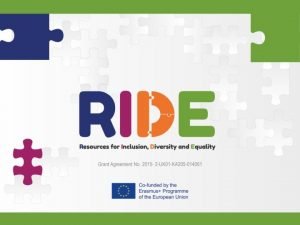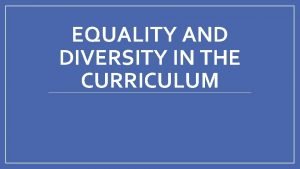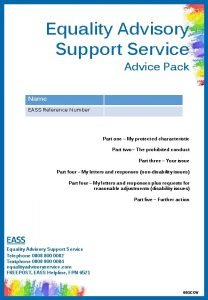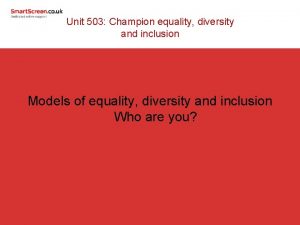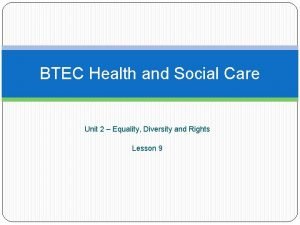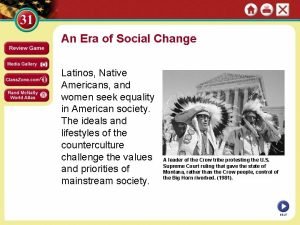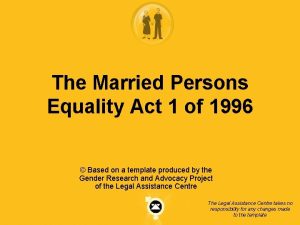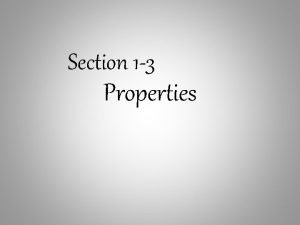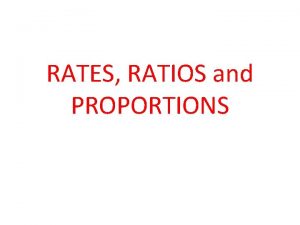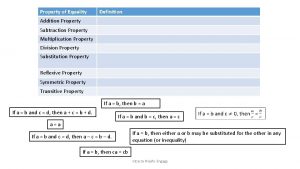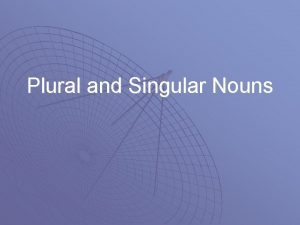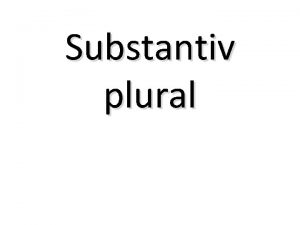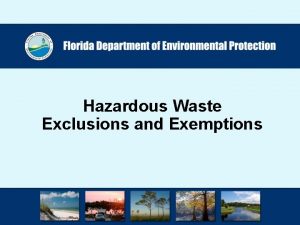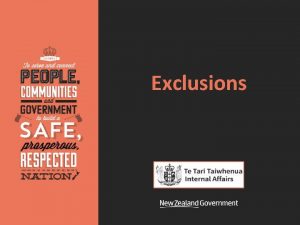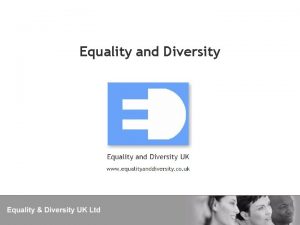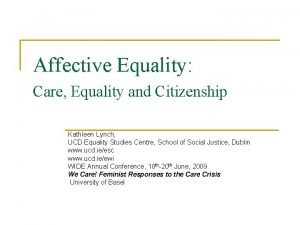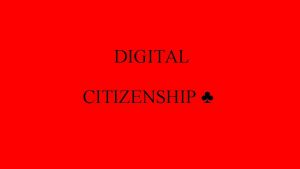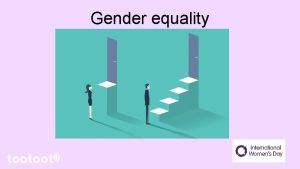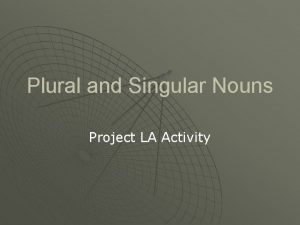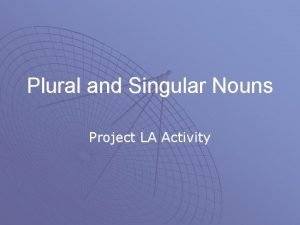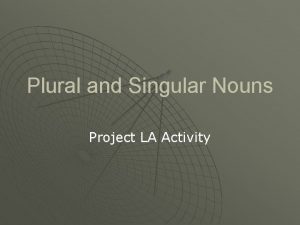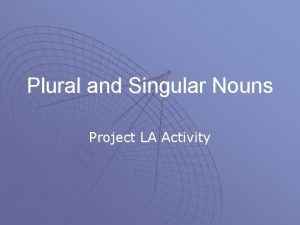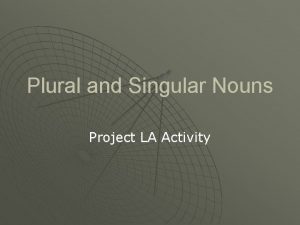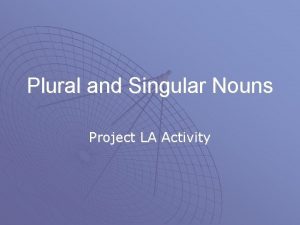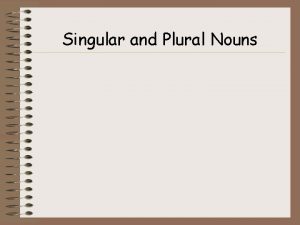Allegiance Equality Plural Citizenship and Exclusions in the










































![Some Cases Shalabi & another v AG [1972] 1 GLR 259 -270 • Failed Some Cases Shalabi & another v AG [1972] 1 GLR 259 -270 • Failed](https://slidetodoc.com/presentation_image/01cfc56660e2601ee0a7340f807bd084/image-43.jpg)

































































































- Slides: 140

Allegiance, Equality, Plural Citizenship, and Exclusions in the 4 th Republic S. Kwaku Asare University of Florida ©S. Kwaku Asare (2018) 1

Allegiance, Equality, Plural Citizenships and Exclusions in the 4 th Republic Allegiance Article Exclusions Constitutional Ticking Bomb Plural Citizenship Article Equal Citizenship Single Citizenship Article ©S. Kwaku Asare (2018) 2

The Allegiance Article 94(2)(a) • “A person shall not be qualified to be a member of Parliament if he owes allegiance to a country other than Ghana. ” ©S. Kwaku Asare (2018) 3

Equal Citizenship Definition Chapter 3 and 7 • Equal citizenship means every citizen, as defined by Chapter 3 of the constitution, is entitled to the same rights, as defined in Chapter 7. • Citizenship confers status and a specific set of universal rights • Citizenship gives everyone the same status as peers in the political public (e. g. , Article 55(10)). • This principle, more than any, animated the 4 th republican Constitution ©S. Kwaku Asare (2018) 4

The Single Citizenship Article • “A citizen of Ghana Shall cease forthwith to be a citizen of Ghana if, on attaining the age of twenty-one years, he, by a voluntary act, Article 8(1) [1992 other than marriage, acquired or retains the citizenship of a country other than Ghana. ” Constitution] ©S. Kwaku Asare (2018) 5

The Plural Citizenship Article 8(2), Constitution (Amendment) Act, 1996 • “A citizen of Ghana may hold the citizenship of any other country in addition to his citizenship of Ghana. ” (Act 527) ©S. Kwaku Asare (2018) 6

The Sources of Office Holding Exclusions Source of Exclusion Denoted in this Presentation Article 94(2), Constitution as Promulgated, 1992 The Allegiance Article Tier 1 Article 8(2), Constitution as Amended, 1996 (Act 527) by 1996 Parliament The Plural Citizenship Penalty Article Tier 2 Section 16, Citizenship Act (2000) (Act 591) as passed by 2000 Parliament The Big Statutory Exclusion Section Tier 3 a Section 13, Special Prosecutors Act (2018) The Small Statutory Exclusion Section Tier 3 b ©S. Kwaku Asare (2018) Excluded Offices categorized as 7

The Allegiance Exclusions Goes way beyond being disqualified from becoming and MP, although that by itself is significant. ©S. Kwaku Asare (2018) 8

Allegiance (Tier 1) Exclusions President (Article 62(c)) Vice President Ministers of State (Article 78) Deputy Minister of State ©S. Kwaku Asare (2018) Cabinet Member Speaker of Parliament Member of Parliament 9

Allegiance (Tier 1) Exclusions Member of Electoral Commission (Article 44) Member of the Public Service Commission (Article 194(3)) Members of the National Commission for Civic Education (Article 232(3)) Member of Lands Commission (Article 263) Member of Regional Lands Commission ©S. Kwaku Asare (2018) Founding Member of a Political Party (Article 55(8) Executive Member of a Political Party (Article 55(8)) Leader of a Political Party (Article 55(8)) 10

Some Paradoxical Results This Person can be This person is an • an Asantehene, into whose hands stool lands are vested, but barred from serving on the Ashanti Region Land Commission. • A Chief of Staff but not a Minister • Outsider. Not a Full Member of the Political Community. • Spectator not a Citizen!! ©S. Kwaku Asare (2018) 11

Tier 2 (Article 8(2) or Act 527) Exclusions Dual Citizen penalty Article • … No citizen of Ghana shall qualify to be appointed as a holder of any office specified in this clause if he holds the citizenship of any other country in addition to his citizenship of Ghana • Ambassador or High Commissioner; • Secretary to the Cabinet; • Chief of Defence Staff or any Service Chief; • Inspector-General of Police; • Commissioner, Customs, Excise and Preventive Service; • Director of Immigration Service; and • any office specified by an Act of Parliament. • Deemed unconstitutional by Justices Sophia Akuffo and Rose Owusu in Asare v AG [2012] ©S. Kwaku Asare (2018) 12

Tier 3 a Exclusions (Big Statutory Exclusions, Act 591) . . No citizen of Ghana shall qualify to be appointed as a holder of any office specified in this subsection if he holds the citizenship of any other country in addition to his citizenship of Ghana • Chief Justice and Justices of the Supreme Court; • Commissioner, Value Added Tax Service; • Director-General, Prisons Service; • Chief Fire Officer; • Chief Director of a Ministry; • The rank of a Colonel in the Army or its equivalent in the other security services; and • Any other public office that the Minister may by legislative instrument prescribe. • Deemed Unconstitutional by the Supreme Court (7 -2) in Asare v AG (Atuguba and Akoto Bamfo dissenting) ©S. Kwaku Asare (2018) 13

Some Paradoxical Results A Dual citizen can be Deputy IGP but not IGP A Lieutenant Colonel but not a Colonel ©S. Kwaku Asare (2018) The World's foremost expert on VAT or FIRE but not serve as VAT or FIRE czar here 14

Tier 3 b Exclusions (Small Statutory Exclusions, (Act 959)) No person found to owe allegiance to any country other than Ghana shall occupy the post of Special Prosecutor ©S. Kwaku Asare (2018) 15

Some Paradoxical Results A Dual citizen can be Director of Public Prosecutions Or Deputy Special Prosecutor ©S. Kwaku Asare (2018) But not Special Prosecutor 16

Consequences Criminal Prosecution • In recent times, Adamu Sakande, an MP was sentenced to prison on matters relating to Article 94(2)(a). Pre-Confirmation Renunciations • Mona Quartey • Joseph Boahene Parliamentary Rejections • Akwasi Prempeh (Deputy Minister for Ashanti Region) ©S. Kwaku Asare (2018) 17

Consequences Plural Citizens are supposed to be citizens yet • They have no voice in the legislature • They cannot be in the Cabinet • When they feel their rights are imperiled, they face a Supreme Court that they cannot belong to • They cannot start Political Parties to fight for their interest • They cannot lead or be executive members of Political Parties • They cannot belong to the Electoral Commission, NCCE, Public Service Commission • Dual citizens cannot hold at least 27 positions • Parliament can exclude them from more positions with a simple majority • Parliament passed a law and 2 SCJ agree that even a minister can exclude them ©S. Kwaku Asare (2018) 18

Consequences As they say Citizenship without political rights ©S. Kwaku Asare (2018) That one to be citizenship? 19

Why these Chains? Loyalty and Fidelity • “I am inviting this Honourable Court to ponder over these two hypothetical cases. • How can the loyalty of say a Colonel in the Ghanaian Army be guaranteed if there is a war between Ghana and Nigeria and the said Colonel holds both citizenship of Ghana and Nigeria? • How can one be sure of the commitment and loyalty of Ghanaian High Commissioner to UK if there is a diplomatic row between Ghana and UK when the same Ghanaian High Commissioner holds a British citizenship as well? ” • Attorney General in Asare v AG (2012) ©S. Kwaku Asare (2018) 20

Why these Chains? Loyalty and Fidelity? Really? • Is such mindless speculation a proper basis for these wholesale exclusions? • Why do you trust a Lieutenant Colonel but immediately distrust him when he becomes a Colonel? • Why bar someone from being a high commissioner in all countries even if you can prove that he has questionable loyalty to UK? • How can anyone guarantee the loyalty and fidelity of anyone? • What do these terms even mean? • Even the Supreme Court of Ghana finds this to be an unsound basis for these exclusions ©S. Kwaku Asare (2018) 21

Why these Chains? The loyalty and Fidelity Concerns Are Not Evidence based • No Plural citizen of Ghana has ever been found to be disloyal or to be an Infidel • But some single citizens have been, although no rational person will use that to exclude all single citizens from holding office • Prime Minister Netanyahu credits Meyer Habib, a French Israeli in France’s Parliament, for the cooperation of the two countries in fighting terrorism. • I don’t know how to measure loyalty but I know some plural citizens whose sweat and treasure went into establishing the 4 th Republic • And whose loyalty to Ghana is unquestionable! ©S. Kwaku Asare (2018) 22

Purpose I will advance 5 propositions in this presentation: • The ALLEGIANCE article, is widely misunderstood and misapplied; • The SINGLE CITIZENSHIP article, committed a cardinal sin when it revoked the citizenship of many Ghanaians against their will, where such citizens had not chosen to renounce same; • The Plural Citizenship Article to fix the SINGLE CITIZENSHIP article was botched and created even more profound constitutional problems; • The legislative sanctions imposed by Section 16 of Act 591 (Citizenship Act of 2000) are corrosive of democracy, constitutionalism and equal citizenship; • Section 13(1) of Act 959 (Special Prosecutor Act of 2018) is completely misconceived. ©S. Kwaku Asare (2018) 23

Purpose Consequentially, it is time to repeal • Allegiance Article • Plural Citizenship penalty Article • Big Statutory Exclusion Section • Small Statutory Exclusions Section ©S. Kwaku Asare (2018) 24

Common Thread in the Impugned Laws Exclusionary Instruments are an affront to our most fundamental Constitutional Value • These exclusions are antithetical to the principle of equal citizenship, which not only animates the 1992 Constitution but was the basis for the union created in 1957, after independence from the United Kingdom. ©S. Kwaku Asare (2018) 25

The Fierce Urgency of the Proposed Repeal National Imperative No Roots Irrationality • I Do Not Want to Sound Alarmist but fact is Grievances relating to citizenship rights are the #1 cause of conflict in post-independence Africa. • The exclusions are not rooted in law, economics, or history and ignore contemporary norms • The proposed repeals resolve a plethora of illogicalities that flow from a purposive misinterpretation of the Constitution and selective application to some citizens (e. g. , Adamu Sakande) ©S. Kwaku Asare (2018) 26

The Fierce Urgency of the Proposed Repeal No Lip Service Plural is not Fractional • The repeals are based on the need to stop paying lip service to our commitment to the reality of plural citizenship. • We opted for Plural citizenship not Fractional Citizenship ©S. Kwaku Asare (2018) 27

The Conundrum on Full Display NPP’s Parliamentary Caucus President Nana Akufo Addo (12/17/2017) • “A person shall not be qualified to hold executive position in NPP if he holds allegiance to a country other than Ghana. ” (see also Kwaku Antwi-Bosiako et al. v AG & Others (JI/18/2018) • “the motion to amend the constitution of the party which will make it impossible for dual citizens to hold party office and contest for election will lead to the collapse of our overseas branches and will be withdrawn. ” ©S. Kwaku Asare (2018) 28

The Conundrum Compels the Asking of an Obvious question How can a provision of the National Constitution be considered too toxic for inclusion in the constitution of a political party? Alternatively, what is the case for retaining in the National Constitution articles that are considered too toxic for inclusion in the constitution of political parties? ©S. Kwaku Asare (2018) 29

My Answer to the Obvious Question My Answer How Others Answer The Logical Solution • The Allegiance Article is a Harmless Article, that it is Opportunistically Misapplied and Purposively Misunderstood • Alternatively, if my argument is not sustainable then the Article, as understood and applied, is too toxic to remain in the Constitution • Either way it is time to Repeal the Article and other Derivative Articles and Statutory enactments from the Constitution and the Statutes ©S. Kwaku Asare (2018) 30

Overriding Contention I will contend that maintaining these exclusions • reduces plural citizens to fractional citizens, • undermines the important value of equal citizenship by creating citizens with fractional rights, and • institutionalizes a them (plural citizens) versus us (single citizens) mindset • that empowers Judges of the Supreme Court to liken plural citizens “to slaves with two masters” or to narrate the story of how the Philistines rejected David in Samuel 29: 1 -11, an obvious invitation to single citizenship Ghanaians to reject Ghanaian citizens with plural citizenship. ©S. Kwaku Asare (2018) 31

The Presentation Proceeds as Follows A Short History of Citizenship and Plural Citizenship Overview of Plural Citizenships and why Natural Born Ghanaians who are Plural Citizens should not be expected to renounce their citizenships The Case against Exclusions The Liberal Conception of Citizenship in the 1992 Constitution ©S. Kwaku Asare (2018) • Trusteeship Theory • Treaty Obligations • Liberal Citizenship Theory • Economic Theory • Constitutional Theory 32

Citizenship Timeline Ghanaian citizenship is of very recent vintage • May 1957 ©S. Kwaku Asare (2018) 33

CITIZENSHIP TIMELINE ©S. Kwaku Asare (2018) 34

Citizenship Timeline Ghana is a nation of plural citizens • Colonial and Commonwealth Heritage • Uncontrolled Borders • Migrant Labour • Pan Africanism • Cross country marriages ©S. Kwaku Asare (2018) 35

Citizenship Timeline The doctrine of “Born a Ghanaian anywhere, always a Ghanaian everywhere” is an important part of our formation documents ©S. Kwaku Asare (2018) 36

Born a Ghanaian Anywhere, Always a Ghanaian Everywhere If any citizen of Ghana of full age and capacity who is also a citizen of another country makes a declaration in the prescribed manner of renunciation of citizenship of Ghana, the minister, if he is satisfied that the person is not ordinarily resident in Ghana, shall, and in all other cases, may cause the declaration to be registered; and upon the registration, that person shall cease to be a citizen of Ghana: • Provided that the Minister may withhold registration of any such declaration if in his opinion is contrary to public policy. [1957 Ghana Citizenship and Nationality Act, Section 15] ©S. Kwaku Asare (2018) 37

Allegiance Distinguished From Citizenship At independence, there was an allegiance article in the Constitution, although, of course, it is obvious that it could not pertain to plural citizenship as such an interpretation will disqualify everyone. ©S. Kwaku Asare (2018) 38

Allegiance Distinguished from Citizenship “No person shall be qualified to be elected as a member of Parliament who is by virtue of his own act, under any acknowledgment of allegiance, obedience or adherence to a foreign power or State. ” Section 25(a) of 1957 Constitution. ©S. Kwaku Asare (2018) 39

Allegiance as a Ritual Allegiance is mentioned once in the 1960 Constitution as part of the oath taken by the President in Article 12 • “I do solemnly swear that I will well and truly exercise the functions of the high office of the President of Ghana, that I will bear true faith and allegiance to Ghana”. ©S. Kwaku Asare (2018) 40

Allegiance as a Ritual “any citizen of Ghana shall be qualified for election as President if he has attained the age of 35 years. ” (Article 11(a)) Plural citizenship continued by 1957 Nationality Act under the first Republic No office-holding exclusions • Geoffrey Bing was AG ©S. Kwaku Asare (2018) 41

Citizenship Timeline Over the years, Politicians have exploited plural citizenship for political gains • Deportations (many members of Muslim Association Party) • Contempt of Court orders (Balogun) • Statutes • Common Law (Shalabi (1972); Fattal (1981); Mekkaoui (1981) • Constitutional Insertion and Misinterpretation (1969, 1979, 1992) ©S. Kwaku Asare (2018) 42
![Some Cases Shalabi another v AG 1972 1 GLR 259 270 Failed Some Cases Shalabi & another v AG [1972] 1 GLR 259 -270 • Failed](https://slidetodoc.com/presentation_image/01cfc56660e2601ee0a7340f807bd084/image-43.jpg)
Some Cases Shalabi & another v AG [1972] 1 GLR 259 -270 • Failed attempt to strip Ghanaian citizenship from 2 Ghanaians born in Gold Coast in 1933 and 1935 to Lebanese Parents. • A brave Justice Hayfron-Benjamin stopped the AG. Fattal & another v. Minister of Internal Affairs & another [1981] GLR 104 -135 • The Supreme Court refused to strike down SMC Decrees depriving the plaintiffs (naturalized Ghanaians) of their citizenship. • Mohamed Fatal and Mahmoud Fattal deprived of their naturalized citizenship even though they had renounced their Lebanese citizenship for alleged failure to pay import duties • The decrees were not invalid even if the process was now contrary to the procedure for deprivation of citizenship outlined by the 1979 Constitution. Mekkaoui v Minister of Internal Affairs [1981] GLR 664 -722 • Another attempt to deprive a naturalized Ghanaian who had arrived in Gold Coast in 1956 and acquired citizenship in 1976, concurrently renouncing his Lebanese citizenship. • The Action failed only because of absence of dates of the AFRC decree (Amendment Decree 1979 (AFRCD 42)) ©S. Kwaku Asare (2018) 43

The Birth of Anti Plural Citizenship Inexplicably, we made a u-turn and committed the cardinal sin in 1969 when we constitutionalized anti plural citizenship and forcibly revoked the Ghanaian citizenships of plural citizens ©S. Kwaku Asare (2018) 44

The Birth of Anti Plural Citizenship 1969 Constitution • “A citizen of Ghana who acquires the citizenship of another country shall cease to be a citizen of Ghana. ” Article. 9 • “No person shall be qualified to be a member of the assembly who owes allegiance to a country other than Ghana. ” Article 71(2)(a) • The wording of current Article 94(2)(A) was born ©S. Kwaku Asare (2018) 45

The Birth of Anti Plural Citizenship 1979 and 1992 Constitutions • Copy allegiance language and Anti Plural Citizenship language from the 1969 Constitution ©S. Kwaku Asare (2018) 46

The Death of Anti Plural Citizenship (Act 527) Back to our Plural Citizenship Roots (The Constitution Amendment Act 1996) • Restores Plural Citizenship to all who qualify • But retains allegiance clause • And Impose office holding exclusions ©S. Kwaku Asare (2018) 47

The Conundrum of Equal Citizenship and Exclusions 1957 to Now 1957 to 1968 • • Equal Citizenship Allegiance Article Plural Citizenship Allegiance as a non-justiciable duty of loyalty and obedience 1969 to 1992 • • Equal Citizenship Allegiance Article Single Citizenship Allegiance as a non-justiciable duty of loyalty and obedience 1992 to 1996 • • Equal Citizenship Allegiance Article Single Citizenship Allegiance as an exclusionary instrument? ? ? ©S. Kwaku Asare (2018) 1996 to Now • • Equal Citizenship Allegiance Article Plural Citizenship Allegiance as an exclusionary instrument? ? ? 48

Summary The Birth of Ghana • A new country of plural citizens • Citizens so valued that we made it difficult for them to renounce Political Instability Breeds Yoyo Citizenship • Every constitution or statute defined citizenship without regard to prior status • Current constitution takes citizenship away in 1992 for some and restores in 1996 Politicization of Plural Citizenship • We transitioned to a country that takes citizenship away from people without consent • The tumor of deporting Ghanaians from Ghana spread into our statutes and have now metastasized in the Constitution, where it resides very comfortably at Article 94(2)(a). • Deporting Ghanaians, as an indirect way of excluding some citizens from political participation, has now been replaced by direct exclusion through selective enforcement of a nebulous Constitutional article. ©S. Kwaku Asare (2018) 49

Some 1969 Views The question of whether to allow plural citizenships to hold office exercised the minds of our forebears ©S. Kwaku Asare (2018) 50

A Prominent Ghanaian Who said? • “Now, there a lot of inter-marriages among the races and if a person comes to Ghana and marries a Ghanaian woman if their children were made to suffer because of this inter-marriage, then I do not see any justice in this. I want to cite the case of Winston Churchill and Mc. Millan – it is significant to note that the mothers of these statesmen were all Americans but it is on record that these two statesmen were among the very outstanding politicians that Britain has ever had. Therefore, if we are going to discourage people because of birth and preclude them from occupying high positions in our society, it will not be in conformity with civilization and natural justice. ” ©S. Kwaku Asare (2018) 51

A Prominent Ghanaian J. A. Kuffuor, 1968 ©S. Kwaku Asare (2018) 52

A Prominent Ghanaian Who said? • “I do not know who is fifty percent Ghanaian and what an authentic Ghanaian looks like. I do not see any difference between the looks of a Ghanaian and a Togolese. I have listened to so many arguments which seem to me quite ridiculous. When we think of a Ghanaian citizen we are thinking of the legal concept, we are not thinking in terms of biology or physiology. What a Ghanaian is, is a question of law and I do not see that if a person is a Ghanaian citizen by law he is not entitled to the rights of a Ghanaian, and I do not see why some Ghanaian citizens should have lesser rights than others. I think we can approach this question in an impassionate manner. A Ghanaian citizen is entitled to all rights. If politically such a person is not accepted, it is for the people of this country to say so. Now too often we want to decide issues which can be decided by the electorate. If somebody does not look like a Ghanaian and the people of the country do not want him, that is fair enough; but let the people reject him. I have heard the argument that if somebody who is what they refer to as half-Ghanaian becomes President, he may owe allegiance to another country. That may be so, but this is a matter which should be known to the Ghanaian electorate. And if the Ghanaian electorate choose to elect such a person, that is their business. I think this is an issue which should be left to the Ghanaian electorate and that all Ghanaian citizens should be given equal rights. ” ©S. Kwaku Asare (2018) 53

A Prominent Ghanaian Obed Asamoah, 1968 ©S. Kwaku Asare (2018) 54

A Prominent Ghanaian “Let anyone walk to one of our cenotaphs – be it in Kumasi or in Accra, and look at the names of those who fought in defence of this country. Their descendants are here. They fought and gave up the very best that man can give, even life itself in defence of this land. They did not originally come from this country. They came here, fought for us, married Ghanaian women, have produced descendants in this country who call themselves, very proudly, citizens of Ghana. Must it now be suggested that these people who gave up life itself in defence of this country and of liberty and freedom in the Two World Wars, have fought in vain and died in vain? Mr. Speaker, in an expanding world in which we live today, it is the hope of all decent minded men that men the world over shall learn to become brothers, that there shall be no such development as “African personality” or “European personality” or “Jewish personality” but of the human personality. This is the objective and the hope of good statesmen the world over. This is a shrinking world and the more we learn to live together in unity, the better. ” Joe Appiah, 1968 ©S. Kwaku Asare (2018) 55

Comparative Perspectives While we started lives as Plural Citizens, the rest of the world started their lives as anti-Plural Citizens ©S. Kwaku Asare (2018) 56

History of Anti-Plural Citizenship Sentiments • We should "as soon tolerate a man with two wives as a man with two countries. George Bancroft, A US Statesman (1850) • Dual nationality is a "self-evident absurdity. " Theodore Roosevelt (1915) • Several attempts to limit Plural Citizenship • Bancroft treaties 1850 • Sought to prevent USA Plural Citizenship. • Various Supreme Court decisions on plural citizenship neutered them • League of nations one Nationality 1930 • International Law Commission 1954 • Convention on the reduction of the cases of multiple nationality 1963 ©S. Kwaku Asare (2018) 57

History of Anti-Plural Citizenship Why the Aversion? • Citizenship is an international Filing system, a mechanism for allocating persons to states • Since files could only be conceptualized as physical cabinets, it was anachronistic to think of plural citizenship • In the 19 th century, manpower equaled state power and states wanted absolute control over people to enhance military manpower. • Thus legal doctrines reflected this filing concept and manpower needs • In UK, as in the rest of Europe, the legal doctrine was permanent, indivisible allegiance (Calvin’s case 1608, 7 Co Rep 1 a). • In USA, the legal doctrine was expatriation, which allows one to give up his prior citizenship ©S. Kwaku Asare (2018) 58

History of Anti-Plural Citizenship Consequence • Most European countries refused to recognize naturalization in the United States. • Naturalized Americans on family visits back home would often find themselves conscripted into homeland armies. • U. S. authorities would intervene on their behalf resulting in diplomatic dust-ups. • This was part of the reason for the war of 1812 when UK impressed former UK citizens who had expatriated ©S. Kwaku Asare (2018) 59

Globalization and End of Turf War Globalization and end to Turf Wars of the Mid 20 th Century • Today, dual citizens pose no such threat to cordial bilateral relationships. • Many states recognize dual citizens to participate in national elections even though they aren't residents. • Italian/Americans domiciled in the USA can also vote for a North American representative to the Italian Parliament. • Technology allows us to think of filing differently and accept that people can exist in multiple files ©S. Kwaku Asare (2018) 60

Globalization and End of Turf War Nota Bene • Even in the early days it was an issue of who owns the citizen for war purposes • Control, rather than divided loyalty, was the real source of the problem. • Rights were not limited. • There have been few cases of plural-citizens spies or saboteurs. ©S. Kwaku Asare (2018) 61

Globalization and End of Turf War Rest of World • UK foreign secretary is a US citizen • Meyer Habib, a French Israeli in Parliament of France. • Dual citizens can run for any office in USA, including even President Africa • Presidents of Senegal and Somalia are dual citizens • Nigeria Courts, with identical provisions as ours, have held that natural born Nigerians can never be barred from holding any office ©S. Kwaku Asare (2018) 62

Comparative Perspectives Ghana Rest of World Historically At independence, we embraced dual citizenship and were all dual citizens Resisted dual citizenship Reason for historical dual citizenship sentiments Our colonial history and interconnectedness with UK and the Commonwealth. Our founding fathers were ahead on the Globalization curve Property right battle (who owns the soldier) Today Accept dual citizenship with severe restrictions of rights Accept dual citizenship without restrictions of rights Reasons for Today’s Posture Loyalty and Fidelity Globalization and mobility of labor ©S. Kwaku Asare (2018) 63

The ABCs of Plural Citizenship ©S. Kwaku Asare (2018) 64

The ABCs of Plural Citizenship Roadmap • How is citizenship, single or plural acquired? • What does the 1992 Constitution say about Citizenship? • What is the difference, if any, between Citizenship and Nationality? • Why do Natural Born Ghanaians acquire Citizenship of other countries? • Why can’t Natural Born Ghanaians renounce the citizenship of other countries to serve? ©S. Kwaku Asare (2018) 65

Definitions Territorially (jus soli) At Birth by descent (jus sanguinis) by marriage Acquiring Citizenship by investment (e. g. , Bulgaria, Russia, Singapore, Belgium) by professional achievement (e. g. , Austria); Naturalization ©S. Kwaku Asare (2018) by religious beliefs (e. g. , Israel); by continuous stay and integration; etc. (e. g. , Argentina) 66

Definitions From the blood (e. g. , Born to Ghanaian and Nigerian parents) At Birth Acquiring Plural Citizenship From the blood and territorially (e. g. , Born to Ghanaian parents in USA) Born a Ghanaian who later naturalizes in another country (Odehye Runaway) From Naturalization ©S. Kwaku Asare (2018) Born a non-Ghanaian who later naturalizes as a Ghanaian (Yaa broni) 67

Why do Natural born Ghanaians acquire other Citizenships Largely to gain functional advantages • They perceive the substance of the rights that attach to permanent residence and the stability of permanent residence itself (e. g. , the low risk of deportation) to be threatened. • To become eligible for certain positions, grants, etc. • To facilitate travels for positions requiring frequent travels • Involuntarily as a result of position (e. g. , professor) or investment • To safeguard property interest by lowering deportation risk ©S. Kwaku Asare (2018) 68

Why do Natural born Ghanaians acquire other Citizenships seldom as a gesture of allegiance • For instance, new citizens of USA take an oath "to renounce and abjure absolutely and entirely allegiance and fidelity to any foreign prince, potentate, state, or sovereignty of whom or which the applicant was before a subject or citizen. ” • This renunciation is “brutum fulmen” and is of no effect as it relates to the citizenship of Ghana and clearly of no moment to nationality. • remains at best a formality undergone for the benefits that the resulting status confers ©S. Kwaku Asare (2018) 69

Functional versus Affective Citizenship We must distinguish between affective citizenship and functional citizenship ©S. Kwaku Asare (2018) 70

Why not Renounce other Citizenship? It is a ritual which is no cure for the underlying problem, if indeed there is a problem. Renouncing leads to loss of residence It treats permanent residents differently (no loss of residence to serve in Ghana) It could lead to loss of profession or investment It curtails ability to return to the renounced country It could lead to loss of social security and other health entitlements in the renounced country It requires natural born dual citizens to choose between parents ©S. Kwaku Asare (2018) 71

What Does the Constitution say about Citizenship Status Rights Duties ©S. Kwaku Asare (2018) Allegiance Nationality (not used in the Constitution but until 2000 used in title of Statutes) 72

Citizenship as Status and a Bundle of Rights Who (Status) Rights What ©S. Kwaku Asare (2018) Duties 73

Citizenship as Status Single Citizens Dual Citizens (Emigrant Dual Citizens) At Birth Dual Citizens (At Birth) Who (Status) Single Citizens Other (Registration, Foundlings, Adoption) Dual Citizens (Immigrant Dual Citizens) ©S. Kwaku Asare (2018) 74

Citizenship as a Bundle of Rights Political Participation Form, join or contribute to political parties Participate in the jury and assesor system Freehold land owner Can confer citizenship on noncitizens via marriage and adoption Freedom of entry Equality of rights, obligations, economic opportunities and access to public Facilities Equal Participant in the political space Vote and other derivative rights Present election petition ©S. Kwaku Asare (2018) 75

Citizenship Duties Immunity from Defending and restoring the constitution Defend the Constitution Restore the Constitution ©S. Kwaku Asare (2018) 76

Citizenship as Status and Bundle of Rights Who (Status) What (Rights and Duties) Not entrenched Provisions (Articles 6 to 10) Entrenched Provisions 3, 42, 55 (10) ©S. Kwaku Asare (2018) Duty to defend the Constitution Right to participate fully and equally 77

Citizenship versus Nationality Citizenship Cultural At Birth Nationals Who (Status) Other ©S. Kwaku Asare (2018) Not juridical Permanent Owe allegiance under common law Indivisible High Court can not deprive (Article 9(3)) Automatic 78

Citizenship versus Nationality Not cultural At Birth Who (Status) Strictly juridical Other Non-nationals Allegiance is to birth citizenship High Court can deprive (Article 9(3)) ©S. Kwaku Asare (2018) 79

Citizenship versus Nationality While both immigrant dual citizens (Yaa Broni) and emigrant dual citizens (Odehye 3 Runaway) are Ghanaian citizens, only the latter is a Ghanaian National. Yaa Broni is not and cannot be a Ghanaian national and owes no allegiance whatsoever to Ghana. An Odehye 3 Runaway can never relinquish his Ghanaian nationality and owes perpetual allegiance to Ghana. ©S. Kwaku Asare (2018) 80

Citizenship versus Nationality Plural Citizenship but Single Nationality • While you can hold multiple citizenships, you can have only one nationality. • You can renounce your citizenship but you cannot renounce your nationality. Motherland • In this regard, nationality can be likened to a biological mother while citizenship can be likened to a spouse. • That is why we have the concept of a motherland. • Yaa Broni, though Ghanaian, has an unseverable motherland, distinct from Ghana. • An Odehye 3 Runaway, though now a citizen of another country, has Ghana as her unseverable motherland! ©S. Kwaku Asare (2018) 81

Summary Plural Citizenship is here to stay • As long as Ghanaians • Are marrying from other countries • Travelling • Investing • Achieving adopting Plural citizenship arises as a result of operation of laws in multiple countries There is no need to apply for Plural citizenship or dual citizenship card • Dual Citizenship card is optional. Entirely useless with a Ghanaian passport Very Lawful to travel with 2 passports Plural Citizenship is not a diaspora phenomenon ©S. Kwaku Asare (2018) 82

Summary Citizenship entails both status and rights • A citizen who cannot serve on the legislature, apex courts or executive is no citizen at all. Citizenship embodies two relationships. • A vertical relationship between citizen and state dealing with reciprocal rights and duties. • A horizontal relationship among a community of people who share loyalties, civic allegiance, and national character. • On a basic level, these relationships correspond respectively to the "state" and the "nation" that make up the "nation-state. " ©S. Kwaku Asare (2018) 83

Summary Citizenship differs from Nationality • • Citizenship is a legal concept. Nationality is a cultural concept citizenship is not a sufficient condition for nationality Nationality is not a proof of citizenship There is an important difference between “emigrant dual citizenship, ” and “immigrant dual citizenship • Immigrant dual citizens do not owe allegiance to Ghana, notwithstanding what we wish. • Emigrant dual citizens owe permanent and indivisible allegiance to Ghana. ©S. Kwaku Asare (2018) 84

The Non-Legal Case for Equal Citizenship for Plural Citizens As part of closing the loop on government’s investment in their education As part of our commitments under international norms As a premise for representative government As a matter of economics ©S. Kwaku Asare (2018) In recognition of their role in restoring the 4 th Republic All hands on deck 85

Trust Theory Settlor Trustee ©S. Kwaku Asare (2018) Beneficiary 86

Data. Is the Governance Cycle related to the Brain Cycle? Evolution Timeline Brain Hemorrhaging Pre Independence Brain Trust Post Independence ©S. Kwaku Asare (2018) Brain Drain Militarism Brain Gain Return to Constitutions 87

The Planned Brain Cycle Brain Train Brain Gain ©S. Kwaku Asare (2018) 88

Realized Brain Cycle Brain Train Brain Drain Brain Pain ©S. Kwaku Asare (2018) 89

Using Equal Citizenship to Close the Brain Cycle Loop Brain Hemorrhaging Brain Train Brain Trust Brain Pain ©S. Kwaku Asare (2018) Brain Drain Brain Draw Brain Gain 90

Commitments under International Treaties Universal Declaration of Human Rights (Article 21) • Everyone has the right to take part in the government of his/her own country, directly or through freely chosen representatives Article 25 of ICCPR • Every citizen shall have the right and the opportunity, …without any of the distinctions mentioned in article 2 and without unreasonable restrictions: • To take part in the conduct of public affairs, directly or through freely chosen representatives; • To vote and to be elected at genuine periodic elections which shall be by universal and equal suffrage and shall be held by secret ballot, guaranteeing the free expression of the will of the electors; • To have access, on general terms of equality, to public service in his country. ©S. Kwaku Asare (2018) 91

Liberal Citizenship Theory Citizenship is defined as the right to participate fully in the political space • The notion of belonging means full membership in a group and the ability to influence one’s destiny by having a significant voice in basic decisions ©S. Kwaku Asare (2018) 92

The Economic Case Source of Untapped Wealth • African development Bank estimates that Diaspora Africans are saving up to $53 billion in the destination countries every year. • How much do Diaspora Ghanaians save? So much more can be done by way of • • • Diaspora Bonds Diaspora Investment Fund Diaspora Insurance Funds Diaspora Pension Funds Securitization of future remittance Flows But nothing can be done • When you start on the premise that they are disloyal and infidels, which no reasonable rational person believes to be the case ©S. Kwaku Asare (2018) 93

The Economic Case – Source of Untapped Wealth ©S. Kwaku Asare (2018) 94

The Legal Case for Equal Citizenship for Plural Citizens The current laws on exclusions • are not just incurably flawed but they are misunderstood, misapplied, selectively enforced and of doubtful constitutional validity. As such, • they should never have come into being; • should have been scrapped decades ago; and • there is no reason at all to have them on the books today. ©S. Kwaku Asare (2018) 95

Basic Propositions Article 94(2)(a) • on allegiance is widely misunderstood and misapplied. • Upon a careful reading of the Constitution, it is directed to only a limited class of citizens. Article 8(2) (1996) aka Act 527 • The attempt to fix Article 8 (1992) failed to to distinguish citizenship as status and as rights and impermissibly diluted the latter. • Thus, Article 8(2) (1996) does too much harm and too little good. Act 591 (Citizenship Act of 2000), Section 16 • is corrosive of democracy, constitutionalism and equal citizenship. • No transient majority in Parliament can properly dilute the right of others Act 959 (Special Prosecutors Act of 2018), Section 13 • More abuse of the Constitution and evidence of Parliamentary destruction of Citizenship rights ©S. Kwaku Asare (2018) 96

Propositions Proposition 1 Proposition III Proposed Amendments ©S. Kwaku Asare (2018) 97

Proposition 1 Article 94(2)(a) on allegiance is widely misunderstood and misapplied. Upon a careful reading of the Constitution, it is directed to only a limited class of citizens. Tragically • It has been misapplied to send people to jail (Adamu Sakande) • It is being misapplied to harass MPs (Alhaji Umar Alhassan) • It has been misapplied to force people to give up their citizenships • Mona Quartey • Charles Adu Boahen ©S. Kwaku Asare (2018) 98

Proposition 1 Article 94(2)(a) • A person shall not be qualified to be a member of Parliament if he owes allegiance to a country other than Ghana Who is this person? • The popular misconception is this person is a plural citizen, which effectively rewrites the Article as follows: Opportunistically Interpreted as • “A citizen of Ghana shall not be qualified to be a member of parliament if he is also a citizen of another country. ” ©S. Kwaku Asare (2018) 99

Proposition 1 The popular conception that Article 94(2)(a) is directed at dual citizens flounders on • Textual, • Historical, • Literal, • Doctrinal, • Empirical, and • Contextual • Reasonableness grounds ©S. Kwaku Asare (2018) 100

Proposition 1 Textually, the Conception cannot coexist with Article 8(1) • The single citizenship article did not allow for plural citizenship • Thus, it is clear that Article 94(2)(a) is not contemplating plural citizens since they ceased to be citizens of Ghana at 21 • And it wont make any sense to assume that these non-citizens of Ghana were then being told they can’t qualify to be members of Parliament. • The allegiance article could not reasonably have been addressed to citizens of Ghana by birth ©S. Kwaku Asare (2018) 101

Proposition 1 The Conception is inconsistent with the historical view of allegiance and plural citizenship • At Independence, allegiance, plural citizenship and equal citizenship co-existed comfortably in the Constitution and Nationality law. • 1957 Ghana Citizenship and Nationality Act, Section 15 • Permitted Plural Citizenship • Acknowledgment of Allegiance decoupled from Plural citizenship • Plural Citizens not disqualified from parliament or any position. • Due to our peculiar history, such an interpretation would have disqualified every Ghanaian from holding office ©S. Kwaku Asare (2018) 102

Proposition 1 The Conception is inconsistent with a literal reading of Article 94(2)(a) • Allegiance is not the same as citizenship or the framers would have said so. • Compare to Section 44 of Australia Constitution where framers wanted to exclude on grounds on both allegiance and plural citizenship • Compare to US oath of citizenship, which requires renounce allegiance but decouples that from citizenship ©S. Kwaku Asare (2018) 103

Proposition 1 “Any person who is under any acknowledgment of allegiance, obedience, or adherence to a foreign power, or is a subject or a citizen or entitled to the rights or privileges of a subject or a citizen of a foreign power shall be incapable of being chosen or of sitting as a senator or a member of the House of Representatives. ” Australia Section 44(i) ©S. Kwaku Asare (2018) 104

Proposition 1 “I hereby declare, on oath, that I absolutely and entirely renounce and abjure allegiance and fidelity to any foreign prince, potentate, state, or sovereignty, of whom or which I have heretofore been a subject or citizen; …. . so help me God. ” • Renounce allegiance, whatever it means, does not mean renounce citizenship of other States ©S. Kwaku Asare (2018) 105

Proposition 1 As a Doctrinal Matter • The framers were keenly aware of and interested in a liberal conception of citizenship • Conceptually, it was therefore highly unlikely that the framers will create a citizen and deny him the right to participate in the public life. • This is why they took away citizenship from the Adehye 3 Runaway ©S. Kwaku Asare (2018) 106

Proposition 1 Contextually • It is highly unlikely that the framers will create another divided society with a permanent underclass coming from the Revolutionary days ©S. Kwaku Asare (2018) 107

Proposition 1 Reasonableness test • This construction is the most reasonable given that citizenship connotes a bundle of rights Other Article 94 (2) Disqualifications • are based on something actually done; never on suspicion or speculation that one might do something • Bankruptcy • Tax evasion • High crimes • Death penalty • Election offence • Unsound mind ©S. Kwaku Asare (2018) 108

Proposition 1 As an Empirical Matter • It is a notorious fact the President Rawlings is a plural citizen • And this is no boom!!!! • And the allegiance Article did not apply to him ©S. Kwaku Asare (2018) 109

In Rawlings own words "The first defendant is a citizen of Ghana by birth, born in Accra in 1947 of a mother who was born in Keta in 1919. The first defendant was therefore at birth a British subject who in January 1949 became a citizen of the United Kingdom and Colonies by operation of the British Nationality Act, 1948 (11 & 12 Geo 11, c 56) (of the British imperial legislature), in particular section 4 thereof, and in May 1957 became a citizen of Ghana by birth operation of Act No 1 of the Ghanaian legislature, the Ghana Nationality and Citizenship Act, 1957, in particular section 4 thereof. ” Bilson v Rawlings ©S. Kwaku Asare (2018) 110

Dual Citizenship ≠ Dual Allegiance “As head of state he is the commander-in-chief of the Ghana Armed Forces. He had been a member of two governments of the Republic of Ghana. Currently, he is the head of state of Ghana. It is therefore to be expected that in these capacities he had on several occasions sworn allegiance to the Republic of Ghana. So that even if on attaining the age of 21 then he had dual citizenship (which is not admitted) the irresistible inference which this court draws from the oaths of allegiance he took on these several occasions, is that the first defendant does not owe allegiance to any foreign [p. 424] government. ” Bilson v. Rawlings et INEC [1993 -94] 2 GLR 413— 428 Once again allegiance is procured by oath while not disturbing the underlying dual citizenship Taking oath of allegiance is prima facie evidence of not owing allegiance to any foreign government ©S. Kwaku Asare (2018) 111

Proposition 1 So who then is the person in Article 94(2)(a)? • Given the number of exclusions, it had to be a person who could fix the allegiance issue fairly quickly • Upon careful reading, it applies to immigrant dual citizens (Yaa Bronis) who are currently in the mezzanine class of Article 8 ©S. Kwaku Asare (2018) 112

Proposition 1 Article 8 (2) • “A person who becomes a citizen of Ghana by registration and immediately after the day on which he becomes a citizen of Ghana is also a citizen of some other country, shall cease to be a citizen of Ghana unless he has renounced his citizenship of that other country, taken the oath of allegiance specified in the Second Schedule to this Constitution and made and registered such declaration of his intentions concerning residence as may be prescribed by law, or unless he has obtained an extension of time for taking those steps and the extended period has not expired. ” ©S. Kwaku Asare (2018) 113

Proposition 1 Summary • Article 94(2)(a) is not directed to natural born Ghanaians, whether or not they are dual citizens. • It is directed at registered Ghanaians who have asked for an extension of time • To renounce their citizenship; • Take the oath of allegiance in Second Schedule of the Constitution; and • To declare intentions of residence in the constituency Comparative Jurisprudence • Nigeria Courts have the same language and have arrived at the same conclusion • See. , Ogbeide vs Osula [2004] 12 NWLR; Professor Odidi & Akeem Bello vs. INEC. {Suit FHC/ABJ/CS/28/07} ©S. Kwaku Asare (2018) 114

Allegiance, Equality, Plural Citizenships and Exclusions in the 4 th Republic Allegiance • Probably the least understood therefore most controversial article • Not defined by the Constitution • The duty of loyalty and obedience owed by all persons born within the King’s realm that attaches immediately upon their birth and that they cannot be relieved of by their own action (Common Law). Cultural versus Exclusionary Instrument • Its usage as a cultural rallying concept is universally acknowledged • Better conceptualized as the cultural tissue of the nation • When it is deployed as an instrument to exclude some citizens from fully participating in the political space, it raises some profound questions about equal citizenship ©S. Kwaku Asare (2018) 115

Allegiance: Other Possibilities Serving as Honorary Consul for another Country Serving in the military of other countries Catholics in relationship to the Pope (e. g. , Crittenden v Anderson (1956)) Supporting a foreign enemy in war time Seccesionists ©S. Kwaku Asare (2018) 116

Proposition 2 Act 527 • repealed the Single Citizenship Article of the Constitution, and replaced it with the plural citizenship article and Tier 2 exclusions, which ban plural citizens from holding 6 named offices and any office specified by Parliament This was most irregular and resulted in Asare v AG ©S. Kwaku Asare (2018) 117

Citizenship Proposition 2 Who (Status) Not entrenched Provisions (Articles 6 to 10) Parliament has the power to amend using nonentrenched procedures Article 8(1) as amended is Constitutional Parliament has no power to amend using nonentrenched procedures What (Rights and Duties) Entrenched Provisions 3, 42, 55 (10) Amended Article 8(2) is unconstitutional Rights cannot be disturbed by ordinary legislation as delegated ©S. Kwaku Asare (2018) 118

Proposition 2 Will the Court protect these entrenched rights if a transient parliamentary majority picks on a minority population and disturbs these entrenched rights without going through a referendum or worse still without going through a constitutional amendment? ©S. Kwaku Asare (2018) 119

Proposition 2 Half a Loaf is better than none Jurisprudence • It is progress if those who previously had full dual citizenship rights give up some of their rights to allow more people who lost their citizenship to regain new citizenship right with limited rights. Judicial Tyranny • The Court assumes the power to “dilute the rights of some people to grant diluted rights to others. ” • To their credit, neither Parliament, the Executive or even the AG made such a dangerous argument • Conditional Rights are Alien to our Constitution • Nowhere in the unamended Constitution could such a conditional right be found ©S. Kwaku Asare (2018) 120

Proposition 2 Equality Argument • Although the Court agreed that loyalty and fidelity are not legitimate, let alone compelling, reasons for discrimination, it said that it does not have to be persuaded by the cogency of the rationale for a legislative purpose before it can see its way to enforcing that purpose • It is not the function of the Courts to declare whether legislative policies are sound or not ©S. Kwaku Asare (2018) 121

Proposition 2 Really • What use is a fundamental right then? • Parliament may or may not have a good reason to disturb a fundamental human right!!! • Return to Parliamentary Supremacy • It is fundamentally wrong to say that Parliament may or may not have a good reason to disturb a fundamental right • Parliament must have more than a good reason and any disturbance must be narrowly tailored ©S. Kwaku Asare (2018) 122

Proposition 2 Political Participation • The plaintiff is right in pointing out the citizen’s inalienable right to political participation. • However, this right is not absolute. Holding • “What gives me cause for concern is the power given to parliament under Article 8(2) to specify any office from which dual citizens will then be disqualified from holding. In my view, the spirit of the Constitution imposes a limit on the legislative discretion thus conferred. • For instance, if Parliament were to enact a law specifying that dual citizens are disqualified from all public offices, that would be an unconstitutional infringement of Article 55(10). ” ©S. Kwaku Asare (2018) 123

Proposition 2 Summary • Loyalty argument dismissed by Court • But Court says it is not its job to protect fundamental human rights • The spirit of the Constitution protects dual citizens • Parliament can exclude them from anything as long as they are not excluded from everything ©S. Kwaku Asare (2018) 124

Proposition 2 Question • Will any Court say such a thing if you took the adjective “dual” away and replaced it with something else such as (Trustee citizens; Protectorate Citizens; Colony Citizens; border citizens; christian citizens; fanti citizens; etc)? • Will a Court with a dual citizen voice allow such an anticonstitutionalism result? ©S. Kwaku Asare (2018) 125

Proposition 3 Section 16 of Act 591 (Citizenship Act of 2000) is corrosive of democracy, constitutionalism and equal citizenship. ©S. Kwaku Asare (2018) 126

Proposition 3 Citizenship Act 2000 (Act 591). • Parliament using its new power in Act 527 attacked dual citizens under Section 16 of Act 591. Section 16(2) of the Citizenship Act, 2000 (Act 591) • It adds more public office holding exclusions and empowers the minister to add to the list. The Section 16 (2) list is as follows: • Chief Justice and Justices of the Supreme Court; • Commissioner, Custom, Excise and Preventive Service; • Director of Immigration Service; • Commissioner, Value Added Tax Service; • Director-General, Prisons Service; • Chief Fire Officer; • Chief Director of a Ministry; • the rank of a Colonel in the Army or its equivalent in the other security services; and • any other public office that the Minister may by legislative instrument prescribe. (just think about this) ©S. Kwaku Asare (2018) 127

Proposition 3 Justice Date Bah on behalf of Court Majority in Asare v AG • “What gives me cause for concern is the power given to Parliament under article 8(2) to specify any office from which dual citizens will then be disqualified from holding. In my view, the spirit of the Constitution imposes a limit on the legislative discretion thus conferred. For instance, if Parliament were to enact a law specifying that dual citizens are disqualified from all public office, that would be an unconstitutional infringement of article 55(10). ” Justice Date-Bah (with the men concurring) What Spirit? • The fundamentality, inalienability and entrenchment of the right is the constraint • The Spirit of Akoto haunts Asare ©S. Kwaku Asare (2018) 128

Proposition 3 " In my humble opinion, therefore, the fact that an ordinary Act of Parliament undergoes certain levels of scrutiny before enactment is not sufficient justification when there is clear non-compliance with the prescribed procedures and processes stipulated, by the same Constitution that empowered Parliament to alter Article 8(2), for the enactment of alterations to the Constitution. For the foregoing reasons, I am of the view that the addition of the offices of: - • Chief Justice; Commissioner, Value Added Tax Service; Director General, Prisons Service; Chief Fire Officer ; Chief Director of a Ministry; and the rank of a Colonel in the Army or its equivalent in the other security services; • in section 16 (2) (a), (h) – (l), to the list of proscribed positions is unconstitutional. So too is section 16 (2) (m) which purports to empower the Minister to prescribe additional offices by legislative instrument. I would, therefore, declare those provisions null and void. ” (SGD) S. A. B. AKUFFO (MS. ) JUSTICE OF THE SUPREME COURT (Justice Rose Owusu concurring) ©S. Kwaku Asare (2018) 129

Proposition 3 Not only are my Ladyships right but also my Lords are incurably wrong on this one. ©S. Kwaku Asare (2018) 130

Proposition 3 What is Parliament? • Parliament is a transitory political body • It is inhabited by, and at any time is in the hands of, partisans Limitation on Parliament • Parliament has no power to dilute fundamental rights of citizens • It has no power to limit the participation of some citizens in the political space • The exercise of any such power is a fundamental assault on all the values of the Constitution and must be rejected by the Court on application for judicial review. ©S. Kwaku Asare (2018) 131

Proposition 3 Free Government • The very nature of our free government makes it completely incongruous to have a rule of law under which a group of citizens temporarily in office can write a law that deprives another group of citizens of their rights appertaining to citizenship. Rights cannot be Diluted by Constitutional Cut and Paste • Parliament cannot exclude people from holding specified offices merely by taking a constitutional restriction and extending it to other offices ©S. Kwaku Asare (2018) 132

Proposition 3 What Scares me the most • Is not only for Parliament to use ordinary legislation to strip citizens of their rights • But for Parliament to think that such rights-stripping activity can be delegated to a minister • And most sadly for the Supreme Court majority (the women on the panel excluded) to accept that Parliament can do that without recourse to amending the Constitution. Just Imagine how Parliament can abuse this Power • • Exclude ancestors of British Protected Citizens Jews because of possible allegiance to Israel PDC members because of possible allegiance to the revolution Border citizens because of historical and cultural connectedeness; etc. ©S. Kwaku Asare (2018) 133

©S. Kwaku Asare (2018) 134

Citizenship Act (Amendment) Bill, 2018 A BILL ENTITLED CITIZENSHIP (AMENDMENT) ACT, 2018 AN ACT to amend the Citizenship Act (no. 591), 2000 to eliminate restrictions imposed on dual citizens from holding certain public offices. PASSED by Parliament and assented to by the President: Section 16(2) of the Act is hereby repealed. Date of Gazette notification: (insert date here). ©S. Kwaku Asare (2018) 135

Office of the Special Prosecutor Act (Amendment) Bill, 2018 A BILL ENTITLED OFFICE OF THE SPECIAL PROSECUTOR (AMENDMENT) ACT, 2018 AN ACT to amend the Office of the Special Prosecutor Act (no. 959), 2017 to eliminate restrictions imposed on dual citizens from holding certain public offices. PASSED by Parliament and assented to by the President: Section 13(1)(a) of the Act is hereby repealed. Date of Gazette notification: (insert date here). ©S. Kwaku Asare (2018) 136

Repealing Article 94(2)(a) CREATING THE BILL FIRST PUBLICATION SECOND PUBLICATION INTRODUCED IN PARLIAMENT • The Bill can emanate from any MP in response to perceived problems or civil society agitation. • The draft bill must be published in the Gazette for at least 90 days. • The draft bill must be published a second time for at least 10 days. • The bill is introduced in the name of the sponsoring MP or Committee. FIRST READING ADVISORY STAGE SECOND READING THIRD READING • Speaker reads the long title of the Bill and the sponsor rises and bows. The Bill is referred to the Council of State. • The Council of State considers and renders an advice on the Bill within 30 days of receiving it. • Parliament receives the Council’s advice, debates the Committee’s report and the principles and policies of the Bill. • Parliament votes and at least 183 (2/3) votes are needed to advance it. • Further debates on the principles and policies. • Parliament votes again and at least 183 (2/3) votes are needed to pass the bill. CLEANING STAGE ASSENT STAGE • The clerk makes any changes to reflect the third reading. The clean copy is sent to the Government Printer. • The Clerk sends the Clean copy to the President for assent. • The President shall assent to it.

Repealing Section 16 of Citizenship Act and Section 13(1)(a) of Special Prosecutors Act CREATING THE BILL GAZETTING FIRST READING COMMITTEE STAGE • The Bill can emanate from any MP. However, typically bills, drafted by the Legislative Drafting Division, have emanated from the Cabinet. • A draft bill must be published in the Gazette for at least 14 days before it is introduced in Parliament. • Speaker reads the long title of the Bill and the sponsor rises and bows. The Bill is referred to the appropriate Committee • The Committee does an in depth review of the bill, holds public hearings and produces a report. SECOND READING CONSIDERATION STAGE REDRAFT STAGE THIRD READING • The House receives the Committee’s report and debates the principles and policies of the Bill. • The bill is debated and amended clause by clause. Amendments are voted upon. • The Bill is sent to the Legislative Drafting Division to incorporate any amendments. • Further debates on the principles and policies as well as amendments can be offered and voted upon. CLEANING STAGE ASSENT STAGE • The clerk makes any changes to reflect the third reading. The clean copy is sent to the Government Printer • The Clerk sends the Clean copy to the President for assent. The President must assent or veto within 7 days.

Caveat Circumspection is needed when evaluating citizenship rights • Only 43% of eligible Ghanaians voted in the referendum • Ghanaians in the Diaspora were not allowed to vote • Ghanaians in the Diaspora were a constant pain to the PNDC • The GBA and NUGS boycotted the consultative assembly • The PNDC remained in the background and engineered the process • Clauses were inserted nicodemously • The Adabraka story ©S. Kwaku Asare (2018) 139

Shatta Wale will Say "Mea me nie odehyɛ run away Ɛyɛ me life sɛ mɛ yɛ dual citizen Ma yɛ wo den na wo bɛ bɔ me away Me de me spa bɛ twa wo kalo Ya brɛ mo ɛne loyalty Sɛ me yɛ dual koraa wofa go pay Plane no ayɛ ma pilot no se away Kwasi, Radha what dem’ah say!" ©S. Kwaku Asare (2018) 140
 Mark e miller sex tape
Mark e miller sex tape Formal equality vs substantive equality
Formal equality vs substantive equality Formal equality vs substantive equality
Formal equality vs substantive equality Christian flag pledge
Christian flag pledge Texas state symbols for kids
Texas state symbols for kids Ray boltz i pledge allegiance to the lamb
Ray boltz i pledge allegiance to the lamb Georgia state pledge
Georgia state pledge Kezia exley
Kezia exley Cigna allegiance providers
Cigna allegiance providers Bahamas pledge of allegiance
Bahamas pledge of allegiance We owe allegiance to no crown apush
We owe allegiance to no crown apush Texas pledge
Texas pledge Pledge to the philippine flag
Pledge to the philippine flag The pledge allegiance
The pledge allegiance Teachers health trust allegiance
Teachers health trust allegiance Indefinite and definite articles spanish
Indefinite and definite articles spanish Plural plural
Plural plural Nationality and citizenship difference
Nationality and citizenship difference Digital rights and responsibility
Digital rights and responsibility Mental health and citizenship
Mental health and citizenship Civic citizenship
Civic citizenship Asare v attorney general dual citizenship
Asare v attorney general dual citizenship Chapter 2 lesson 1 studying geography
Chapter 2 lesson 1 studying geography Global citizenship education topics and learning objectives
Global citizenship education topics and learning objectives Hát kết hợp bộ gõ cơ thể
Hát kết hợp bộ gõ cơ thể Frameset trong html5
Frameset trong html5 Bổ thể
Bổ thể Tỉ lệ cơ thể trẻ em
Tỉ lệ cơ thể trẻ em Voi kéo gỗ như thế nào
Voi kéo gỗ như thế nào Chụp tư thế worms-breton
Chụp tư thế worms-breton Hát lên người ơi alleluia
Hát lên người ơi alleluia Môn thể thao bắt đầu bằng từ đua
Môn thể thao bắt đầu bằng từ đua Thế nào là hệ số cao nhất
Thế nào là hệ số cao nhất Các châu lục và đại dương trên thế giới
Các châu lục và đại dương trên thế giới Cong thức tính động năng
Cong thức tính động năng Trời xanh đây là của chúng ta thể thơ
Trời xanh đây là của chúng ta thể thơ Mật thư tọa độ 5x5
Mật thư tọa độ 5x5 Làm thế nào để 102-1=99
Làm thế nào để 102-1=99 độ dài liên kết
độ dài liên kết Các châu lục và đại dương trên thế giới
Các châu lục và đại dương trên thế giới Thơ thất ngôn tứ tuyệt đường luật
Thơ thất ngôn tứ tuyệt đường luật Quá trình desamine hóa có thể tạo ra
Quá trình desamine hóa có thể tạo ra Một số thể thơ truyền thống
Một số thể thơ truyền thống Cái miệng nó xinh thế
Cái miệng nó xinh thế Vẽ hình chiếu vuông góc của vật thể sau
Vẽ hình chiếu vuông góc của vật thể sau Nguyên nhân của sự mỏi cơ sinh 8
Nguyên nhân của sự mỏi cơ sinh 8 đặc điểm cơ thể của người tối cổ
đặc điểm cơ thể của người tối cổ Giọng cùng tên là
Giọng cùng tên là Vẽ hình chiếu đứng bằng cạnh của vật thể
Vẽ hình chiếu đứng bằng cạnh của vật thể Vẽ hình chiếu vuông góc của vật thể sau
Vẽ hình chiếu vuông góc của vật thể sau Thẻ vin
Thẻ vin đại từ thay thế
đại từ thay thế điện thế nghỉ
điện thế nghỉ Tư thế ngồi viết
Tư thế ngồi viết Diễn thế sinh thái là
Diễn thế sinh thái là Dạng đột biến một nhiễm là
Dạng đột biến một nhiễm là So nguyen to
So nguyen to Tư thế ngồi viết
Tư thế ngồi viết Lời thề hippocrates
Lời thề hippocrates Thiếu nhi thế giới liên hoan
Thiếu nhi thế giới liên hoan ưu thế lai là gì
ưu thế lai là gì Sự nuôi và dạy con của hổ
Sự nuôi và dạy con của hổ Sự nuôi và dạy con của hổ
Sự nuôi và dạy con của hổ Hệ hô hấp
Hệ hô hấp Từ ngữ thể hiện lòng nhân hậu
Từ ngữ thể hiện lòng nhân hậu Thế nào là mạng điện lắp đặt kiểu nổi
Thế nào là mạng điện lắp đặt kiểu nổi Equal comparative and superlative
Equal comparative and superlative Konsep global citizenship education
Konsep global citizenship education Types of citizenship
Types of citizenship Describe citizenship
Describe citizenship Nationality vs citizenship
Nationality vs citizenship Tradisi social science as discipline
Tradisi social science as discipline What is effective citizenship
What is effective citizenship What is global citizenship
What is global citizenship Elements of digital citizenship
Elements of digital citizenship 9 elements of digital citizenship
9 elements of digital citizenship Responsible citizenship means
Responsible citizenship means Citizenship rights
Citizenship rights Citizenship in the world merit badge
Citizenship in the world merit badge Canoeing merit badge worksheet answers
Canoeing merit badge worksheet answers Bsa citizenship in the community
Bsa citizenship in the community Responsible citizenship definition
Responsible citizenship definition Citizenship character trait
Citizenship character trait Elements of digital citizenship
Elements of digital citizenship Personal standpoint welsh bacc example
Personal standpoint welsh bacc example Greece democracy
Greece democracy Nine elements of digital citizenship
Nine elements of digital citizenship Citizenship character counts
Citizenship character counts Stages of corporate citizenship
Stages of corporate citizenship Define active citizenship
Define active citizenship Which of the following is an example of good citizenship?
Which of the following is an example of good citizenship? Social 30
Social 30 Cspe cba
Cspe cba Citizenship competence
Citizenship competence Global citizenship
Global citizenship Characteristics of responsible citizen
Characteristics of responsible citizen Citizenship test en espaol
Citizenship test en espaol Definiton justice
Definiton justice Corporate citizenship definition
Corporate citizenship definition Describe citizenship
Describe citizenship Citizenship in the world merit badge
Citizenship in the world merit badge Global citizenship definition dictionary
Global citizenship definition dictionary Citizenship in the nation merit badge requirements
Citizenship in the nation merit badge requirements Cit in the community merit badge
Cit in the community merit badge Global citizen definition
Global citizen definition What is citizenship
What is citizenship What is citizenship
What is citizenship What is citizenship
What is citizenship Paano maging pilipino ang isang dayuhan
Paano maging pilipino ang isang dayuhan What is citizenship
What is citizenship Digital citizenship definition
Digital citizenship definition Global citizenship framework
Global citizenship framework Aturalizer
Aturalizer 1 thessalonians 4 13-18 nkjv
1 thessalonians 4 13-18 nkjv Care certificate equality and diversity
Care certificate equality and diversity Equality and inequality symbols
Equality and inequality symbols Subtraction properties
Subtraction properties Equality comparatives ejemplos
Equality comparatives ejemplos Comparison of adjectives equality
Comparison of adjectives equality Care certificate standard 4
Care certificate standard 4 Identity property geometry
Identity property geometry Symmetric property of equality
Symmetric property of equality Comparatives of equality and inequality español
Comparatives of equality and inequality español Unit 2: equality and diversity in the community
Unit 2: equality and diversity in the community Hse diversity equality and inclusion strategy
Hse diversity equality and inclusion strategy Mona talent priority
Mona talent priority Define equality and diversity
Define equality and diversity Interpersonal defintion
Interpersonal defintion Equality advisory and support service (eass)
Equality advisory and support service (eass) Unit 503
Unit 503 Favored liberty, equality, and brotherhood
Favored liberty, equality, and brotherhood Unit 2 equality diversity and rights
Unit 2 equality diversity and rights Latinos and native americans seek equality
Latinos and native americans seek equality Equality wheel
Equality wheel Married persons equality act 1 of 1996
Married persons equality act 1 of 1996 Tax equality
Tax equality Transitive property
Transitive property Relfexive property
Relfexive property A statement of equality between two ratios
A statement of equality between two ratios Subtraction property of equality
Subtraction property of equality Properties of equality worksheet
Properties of equality worksheet
